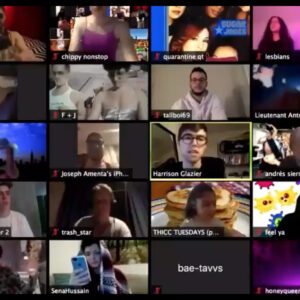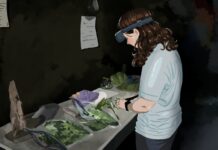When Toronto’s COVID-19 lockdown began in March, DJ and artist Ceréna met up with her friends virtually to play music and hang out over Instagram group video chat. Before meeting again the next night, one of her friends suggested they meet over Zoom video chat instead, as Instagram only allowed for up to six people at a time.
“We were like, ‘Okay let’s download it and tomorrow we will dress up, we’ll kiki. It’ll just be amazing,’” Ceréna said. “We didn’t think much of it. There was about 15 of us on that first night and I was the inaugural DJ. At the time, I didn’t even know what I was doing.”
After partying online amongst her club kid friend group, someone made an Instagram account called @clubquarantine as a joke. Ceréna and her friends, who were already involved in queer nightlife and music scene in Toronto, promoted it on their personal accounts. The handle gained over a thousand followers overnight.
Soon, they started booking DJs from the queer underground community and more and more people started tuning in.
“It just kind of picked up and picked up more,” Ceréna said. “The rest is history.”
Club Quarantine (Club Q for short), the queer online dance party, now boasts over 67,000 followers on Instagram where they post memes, pop culture references and savvy graphics promoting their upcoming events. Since its inception in March, they have hosted DJs and performers from the international queer community.

Hannah Plummer (sophomore), who follows them on Instagram, said Club Q’s rise to prominence is directly related to Gen Z’s use of the internet and social media.
“It’s very Gen Z and sort of shows how fast things can rise during a primarily digital age,” Plummer said. “I know someone had Charli XCX on one of their Zoom shows early on in quarantine.”
By using social media to promote their parties, which have gone from daily to weekly starting at the end of May, Club Quarantine has amassed an international audience, attracting queer communities from as far as Poland, according to Ceréna.
Ceréna describes queer club spaces as their community’s version of a church or religious space, providing sanctuary to queer people who are suffering throughout the pandemic.
“We were doing it really for the community,” Ceréna said. “People [are] tuning in from all over the world: places where it’s illegal to be queer, people who are living in homophobic households.”
Their influence throughout the pandemic grew exponentially with bigger brands and celebrities such as Charli XCX, Kim Petras and Paper Magazine. Ceréna said their partnership with Paper Magazine allowed them to host huge parties and eventually led to them working with icon Lady Gaga on a fundraiser for the Marsha P. Johnson Foundation.
“I screamed when I saw Gaga,” Ceréna said. “I couldn’t believe it. I was here, in my room, hosting Lady Gaga on my computer with this thing I created with my friends.”
Filmmaker Aurora Brachman, who covered Club Quarantine for a New York Times opinions documentary, said in the article that early on in the pandemic, there were 200 to 1,000 participants tuning in each evening, with a smaller group of regulars.
Ceréna said, although people are performing online, their art is not lost in translation through the screen as people are forced to use virtual mediums. They have hosted a variety of artists ranging from pole dancers to musicians to drag queens.
According to Ceréna, one of Club Quarantine’s other co-founders, Casey MQ, intentionally seeks out eclectic performers who exhibit a special “cool factor.”
“Artists come through our space and create such exquisite impactful moments,” Ceréna said. “It’s really interesting to see big companies or big artists use the same medium.”
Ceréna said the nature of their virtual space allows them to present polarizing and contrasting sets, a trend she hopes can continue in real life.
DJ Diana Phillippe, who goes by “Tall and Skiinny” online, performed her first set for Club Quarantine Oct. 2 when they hosted the launch party for Montréal-based fashion brand Premier Jour.
“It’s actually a lot of people,” Phillipe said of her online audience. “I really felt like I was in a club.”
Phillipe said the organizers of Club Q made her feel welcome immediately and she looks forward to potentially working with them again.
“They were like, ‘Okay you’re part of a family,’” Phillipe said. “We all follow each other on Instagram now and we’re planning another party. They were like, ‘Oh, we want to invite you again,’ so I’m excited for that.”
According to Phillipe, Club Q also provides viewers with the PayPal and Venmo addresses of their performers so virtual clubbers can tip them directly.
“The whole team was reminding people to either donate to the brand or to the DJs,” Phillipe said. “It’s for the people.”
Phillipe said she gained around 50 new followers on Instagram through Club Q’s loyal following after her initial announcement as a DJ and gained even more after their set.
While she does not see the virtual club scene lasting forever, Phillipe believes online clubs will be around for a while, even after the pandemic.
“Some people actually just like being at home, or partying with their friends at home and not having to like leave,” Phillipe said. “I feel like it’s the future.”
Ceréna hopes that one day, Club Q can embark on a world tour, meeting and partying with queer local scenes from around the world.
“That would just be incredible and we would hit all of the scenes,” Ceréna said. “It would be streamed, there’d be no ifs, ands or buts. The virtual will always exist and going virtual made us realize how inaccessible the nightlife is.”
Now, their club parties go live every Friday at 6 p.m. PST via Zoom, and they publicize the meeting ID in their Instagram biography. According to Ceréna, Club Q is officially a non-profit organization and she does not want them to adopt a corporate persona.
“I hated putting on a professional voice for writing professional emails,” Ceréna said. “This corporate world that is just such a facade and such objects, all of this needs to come down.”
Ceréna said Club Q made her realize how ableist nightlife, much like our greater society, can be.
“People would message us and be like, ‘Oh my God, thank you so much! As a queer disabled person, this is my first queer club and I’m living my best f**king life,’” Ceréna said. “I would have never thought about that because it just wasn’t on my radar.”
The platform also helped raise awareness for the Black Lives Matter protests and push for racial justice. According to Ceréna, their parties helped direct over $200,000 to a myriad of organizations benefitting queer and transgender Black and Indigenous communities such as For the Gworls and Trans Law Center.
When asked about her favorite dance party Club Q has hosted, Ceréna could not pick one in particular.
“You know it’s a good party when the music is hot and everyone is having lots of fun,” Ceréna said.
Club Quarantine will be celebrating their seven month anniversary Oct. 15.
This article was updated Oct. 20 at 7:28 pm to correct the name of the organization benefitting from the fundraiser with Lady Gaga.
![]()






























